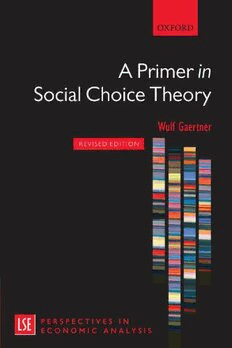
A Primer in Social Choice Theory: Revised Edition (LSE Perspectives in Economic Analysis) PDF
233 Pages·2009·1.105 MB·English
Most books are stored in the elastic cloud where traffic is expensive. For this reason, we have a limit on daily download.
Preview A Primer in Social Choice Theory: Revised Edition (LSE Perspectives in Economic Analysis)
Description:
Processes of collective decision making are seen throughout modern society. How does a government decide on an investment strategy within the health care and educational sectors? Should a government or a community introduce measures to combat climate change and CO2 emissions, even if others choose not too? Should a country develop a nuclear capability despite the risk that other countries may follow their lead? This introductory text explores the theory of social choice. Social choice theory provides an analysis of collective decision making. The main aim of the book is to introduce students to the various methods of aggregating the preferences of all members of a given society into some social or collective preference. Written as a primer suitable for advanced undergraduates and graduates, this text will act as an important starting point for students grappling with the complexities of social choice theory. With all new chapter exercises this rigorous yet accessible primer avoids the use of technical language and provides an up-to-date discussion of this rapidly developing field.
See more
The list of books you might like
Most books are stored in the elastic cloud where traffic is expensive. For this reason, we have a limit on daily download.
